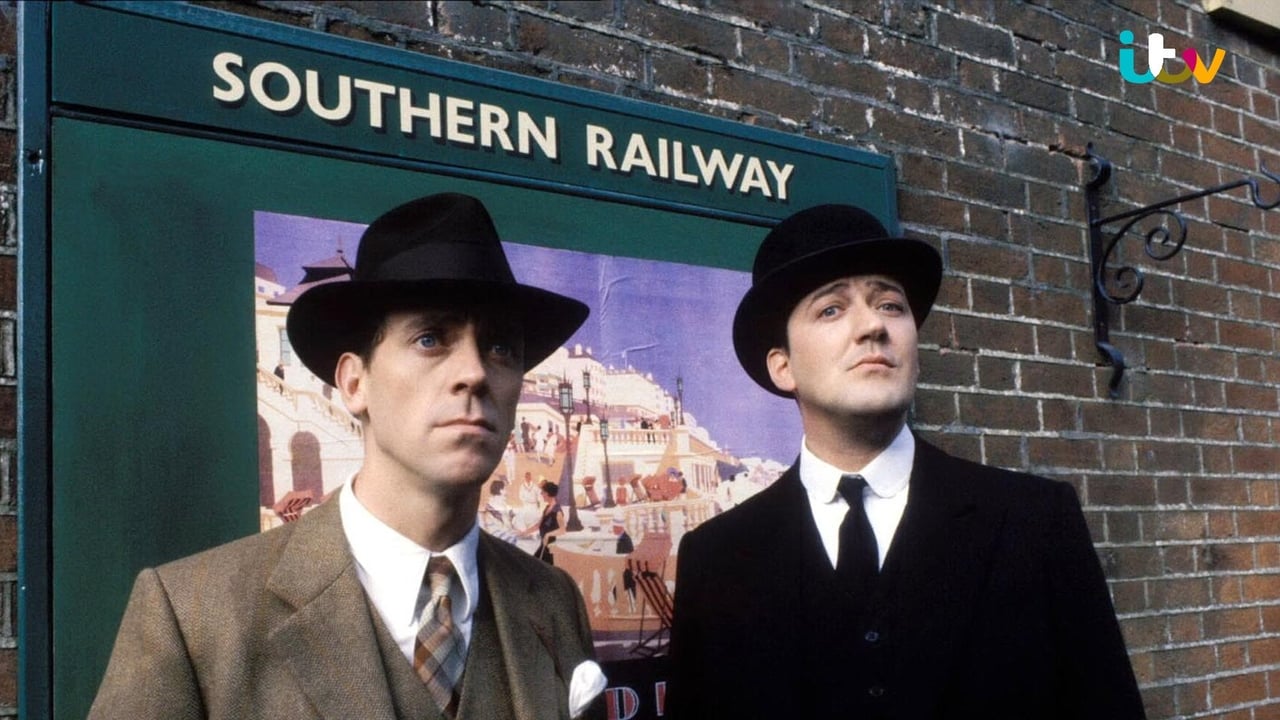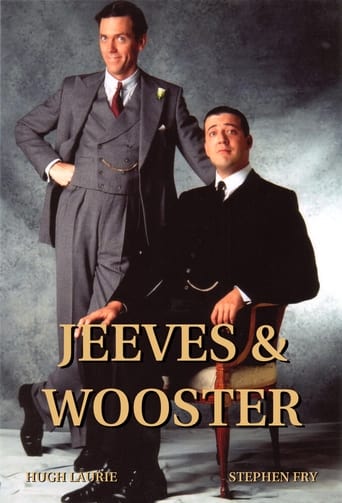

Pelham Greville Wodehouse is a British novelist, most commonly know for his humorous novels. He is that kind of writers, who makes us smile after every sentence. While we watch his character drinking, we are expecting another joke and getting it. His characters are partly ridiculous, partly funny, partly arising sympathy, but always real people, not just paper dolls. Wodehouse lets them be sincere in their expressions. His sense of humour may annoy some fans of modern humorous writers, but in fact, he is a classic of British humour. I would rather read his novels about Jeevse and Wooster instead of his other novels just because of more jokes. I would have better firstly red novels, then see screen version, but I had to see series firstly and then to read novels.So, Bertie Wooster is on of those young English aristocrats of the first third of the XX century, who get all their money from their parents, so they can spend time in all kinds of entertainment instead of work. So Bertie is. Of course, he got Iton and Cambridge education and we from time to time see him recall some citations of philosophers and writers, always incorrectly however. Because of his not quite smart mind he gets in trouble in every novel and without help of his servant Jeevse he would not have solved any problems.And Jeevse (his name isn't mentioned) is Bertie's servant. It's a type of ice-cold polite gentle English servants, outlined with love. He seems to be well-educated and to have a sharp mind. He can find the way out of every difficult situation using his knowledge of human psychology. He also succeeds in attempts to get a desired himself result from Bertie (e. g. to force him not to play the trombone annoying Jeevse).This duet seems to be one of the best comedic duets in comedy films. Fans of «House M. D.» indeed will be pleasant to look at his idol in the youth. And other spectators may just enjoy the series. I don't give «10», because there are no ideal films, sad but true.
... View MoreThis series is worth pure gold galore. It is British and that means the actors are absolutely excellent, the settings and the production are extremely fine and rich. The details are not neglected and that is a real pleasure. The best part is of course the work on the language, the speech patterns, and you can imagine the pleasure they take when the two characters move to New York. The contrast between the extreme aristocratic tone and intonation, the fascinating politeness of Jeeves, the Valet, and the American secular and even gross way of speaking with no affectation is a bag of diamonds on the screen. The action takes place in the 20s or 30s with some kind of fuzziness as for the time period. We seem to still be in the prohibition era, and at the same time not to be in the post 1929 depression. So we could be in the 1920s. That corresponds to the period Francis Scott Fitzgerald preferred for his rich idle young American men and women coming to Europe to enjoy their idleness in pure carelessness. But here these young aristocrats are constantly taken up in innumerable intrigues that have to do with their century old rivalries and jealousies, or their innumerable love affairs and hormonal capers. The main character is not so much Wooster, the aristocrat, but Jeeves, his valet, because he is the one who constantly builds the intrigues, thickens and even sickens the plots, in many ways manipulates his "master" into doing things he would like to do but can't do because he is a valet, a servant, and that would be too risky for him. He is also some kind of guardian angel for his "master" saving him quite often from total perdition at the very last minute. He is the champion of all escape makers and escape planners. But this series goes a lot further than that. We cannot say that the social content is that rich and that we could speak of social criticism. It is a comedy and does not intend to become a social drama or a social epic. That humor is English and only the British can produce it. It is both so elaborate and so extreme that it is hilarious from beginning to end. You thus have all the themes you need to really be humorous from a pure English point of view. You have them all, and even more. Old spinsters, old bachelors, plumbers, bobbies, Anglican priests, twins, old aunts and old uncles being fooled by young nieces and nephews, all kinds of grotesque characters, the fools and the crazies of this world, even some good Africans and judges. You cannot miss the all man's club and the impersonation of so many characters that we just wonder at times if we are not back in Shakespeare's Twelfth Night. Disguises, transvestites, foolish capers, you name it you have it. The rhythm of these parades is so diabolical that you can hardly follow them, even if they are predictable at times to the very second. But they are too funny for you not to play the game. The only missing character is the desert island and the marooned person there under his coconut tree eating ladyfingers. That is a must for those who like British humor, slightly black, definitely grinding to a crazy downfall, certainly not to a halt. I just wonder if we could not say it is a classic.Dr Jacques COULARDEAU, University Paris 1 Pantheon Sorbonne, University Paris 8 Saint Denis, University Paris 12 Créteil, CEGID
... View MoreI watched the show before reading the books, but I absolutely adore both. As others have said, the casting of the two main characters is perfect, though i wish Fry could've had more of a chance to show off.There are a few notable differences between the two mediums, none of which hamper the viewer/reader's pleasure any. In the show, for instance, Jeeves seemed to be more warm-hearted than in the books, where he seemed to me to be more of an untouchable impressive figure, almost cruel at times to Bertie, though always pulling him out of trouble in the end. Fry's portrayal was preferable to the books' character, for me, because I enjoyed the more casual relationship. In the books, Jeeves was almost a father figure, not nearly so close.One reason i enjoy the show so much is the way it ignores pressing world issues. The prohibition is in full swing over in America, but that is only referenced in one episode. The depression is about to hit, and the entire world is going to feel it, perhaps even Bertie. I've always found this fact to make my viewing all the more interesting, because Bertie and his friends take their wealth so casually. The books are written from Bertie's perspective, and as it's plausible that he would ignore socialism and other radical reform movements, economic disputes, prohibition, and other strife synonymous with the 20s, then so would the show. It's a wonderful departure from reality, into a world where your only worry is how to weasel out of unwanted engagements to less-than-admirable girls, or how to avoid your overbearing aunt.It's all of these things that really put the Wodehouse stories and their subsequent television adaptations close to my heart, but it's the lovable characters and the flawless portrayal of them by each respective actor that keeps me drawn to watching this show over and over again.
... View MoreAs based upon the stories of P.G. Wodehouse, the series follows the misadventures of Bertram Wooster and his valet, Jeeves through both England and New York City of the 1920s. In which, the series was produced amid as much the same type of scandal that Tim Burton's Batman (1989) enjoyed following in the footsteps of the original "Batman" (1966) television series as the British public could not believe these two clowns Stephen (Jeeves) Fry and Hugh (Wooster) Laurie from "A Bit of Fry & Laurie" (1986) would be remaking such a wonderful old series as "the World of Wooster" (1965).The original stories by Wodehouse being where the decidedly American tradition of referring to a butler (any butler) as "Jeeves" originates it is absolutely wonderful to watch the idle rich rapscallion Bertram "Bertie" Wooster as he lurches from one crisis to the next leaving his faithful valet (gentleman's gentleman), Jeeves to bail him out of trouble. Comprising a terrific ensemble cast of characters that make up Bertie's friends, associates, and varied love interests the two characters to watch out for are Bertie's aunt, Agatha, who believes that Bertie needs to settle down, get married, and act more mature and responsibly in general; along with (my personal favourite) the high-pitched Madeline with whom Bertie has an on-again-off-again engagement.This on-again-off-again engagement going back to an actual British Law stating that once a man (Bertie Wooster) proposes to a woman (Madeline), and she accepts, they are bound by an verbal contract. Insomuch, if Bertie tries to get out of the engagement by telling Madeline he doesn't want to marry her she has every right under the law to sue for "breach of contract." Only Madeline can break the contract, as is the woman's right. In which it is a delightful comic romp seeing just how Jeeves continually gets Bertie out of trouble.
... View More